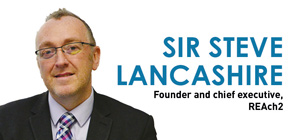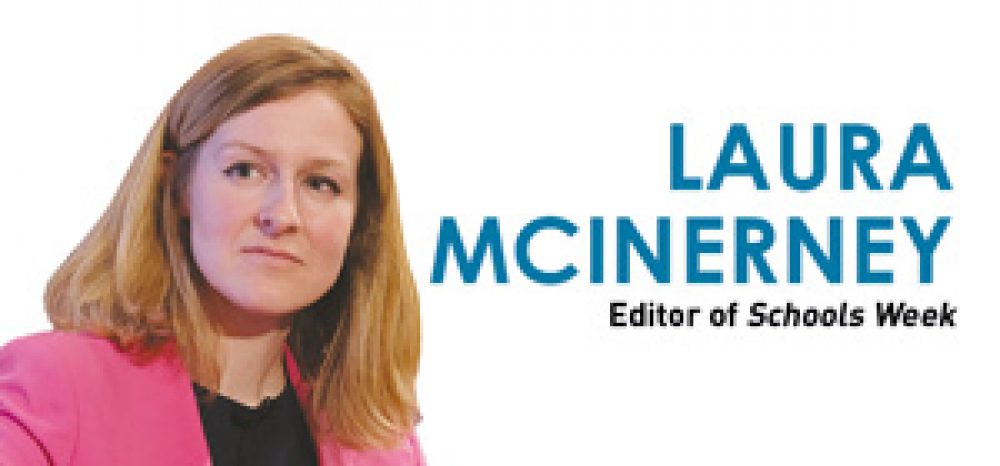The editorial last week led to more responses than any other in schools week’s history. One headteacher board member responded to the criticism – and here, editor Laura McInerney replies.
In 2012, Michael Gove set about reforming GCSEs because he believed the exam system to be “corrupt”. At the time, I balked. Was he saying all pupils who took the exams were corrupt? Was my hard work in getting pupils a top grade an example of corruption? How dare he!
On reflection, Gove was correct about GCSEs. Things had got out of hand. Not on purpose; no one who created the modular exam system did it out of spite. But grade inflation really was happening. Quality was not held even year-on-year. Examiners were selling information under the guise of “training” and undermining fairness. The system was, for want of a better word, corrupted.
I don’t give a stuff about minutes of HTB discussions
I regret that Sir Steve Lancashire believed my editorial last week was pointing at the members of the headteacher boards and calling those individuals “corrupt”. I no more believe the board members are corrupt than I believe a child who sat a GCSE in 2011 was corrupt. But I do believe the system – with its weak rules and crossed incentives – is unreliable and broken.
And I am not alone. Last week’s editorial was one of the most shared on social media in the time I’ve been editing this paper. A litany of emails and personal messages arrived, largely from heads, who said they were grateful for someone speaking up. One problem of the headteacher board system is that almost anyone who might be unhappy with it, also feels implicated in it.
So I’m grateful to Lancashire for stepping up and giving the HTB members a voice. His right to reply gives light to formerly hidden things. It’s great to hear of the work done across academy chains to support those struggling. Tell us more! We always want to know.
But on the system itself being corrupt and self-serving, I stand by the point.
A message from a former senior leader makes the point well.
“In the headteacher board election system, if you’re an elite member of the club you can stand for election. If you’re a member of the club you can vote. And if you’re not in the elite or the club, then you can neither stand nor vote. Let’s be honest – the electoral system of Zimbabwe holds itself to a higher standard.”
My editorial wasn’t intending to imply that people are scratching each other’s backs. It was pointing out that if the system has been set up to allow it, and has incentives built in to encourage it, then, as with the old GCSE systems, you may be doing all the things you are supposed to on an individual level, but the outcome may still be worse overall.

Which brings us to minutes. Let me be clear: I don’t give a stuff about minutes of HTB discussions. But until 2010 the public always had access to information about school decisions.
Yes, the complicated discussions about schools are delicate, and they shouldn’t be compromised. But decisions – final decisions – come about for specific reasons and can be written up sensitively. Hence, I cannot see why these reasons should not be shared. We know from experiments in economics that people make fairer decisions when they have to explain them to the people who those decisions impact most.
And it was Margaret Thatcher, of all people, who in 1959 pushed for the Open Meetings Act on the grounds that transparency provides “the greatest and most effective check against arbitrary action”. She also pointed out that people with powers handed to them from elected members should “safeguard civil liberties, rather than think that administrative convenience should take first place in law”.
It is rare that I am in agreement with Margaret Thatcher. It is even rarer that I agree with her, and Michael Gove. But on this occasion, the lady was correct.
Sadly, it is no one’s job in government to sort this mess. No minister is interested. That’s why I appreciate Lancashire stepping up to speak. And I call on him, and the other members, to point out to the national schools commissioner, David Carter, that the system could work in better ways.
I believe you are a force for good. Please now also be a force for change.
Laura McInerney is the editor of Schools Week








Yeah, not exactly an accurate or fair representation of what happened though.
As I understand it, admittedly relying on Google, what Michael Gove said was “When a small minority cheat, the system is corrupted for others”. (If you have more details it would be helpful to see it). No sane person reading that quote would infer Gove was saying pupils were corrupt.
You, however, said “Headteacher boards are corrupt, self-serving and secretive” and “it is an environment made for corruption to flourish”. You refer to how HTBs “can whisper sweet nothings to the RSC about which school should or shouldn’t be allowed to join a trust, open a school, close a sixth form”. I would suggest that no sane person reading your quotes would think you are talking about anything else other than the individuals on the board.
Just to reiterate, you originally said HTBs were “self serving” and you’re now saying you don’t think the individuals on the board are corrupt?
So what “self” were you referring to?
And don’t even get me started on why you chose to quote someone who drew parallels between HTBs and the electoral system of Zimbabwe which he said “holds itself to a higher standard”. A more classic reinterpretation of Godwin’s Law you couldn’t hope to find. Surely a responsible publication would leave such ridiculous (and frankly offensive to the people that have suffered in Zimbabwe) comments in the trolling corners of the internet where they belong.